#historical political dramas are my number one favourite genre and always have been
Explore tagged Tumblr posts
Text
so I’ve got the empress of ayodhaya (with mai davika) and scarlet heart thailand (with tu tontawan) to look forward to….. icb i’m finally getting some big budget female-led historical thai dramas about political power struggles 😭😭 i have waited so long for this
#I’ve waited so long for more boran lakorns that aren’t only romances 😭😭 (well scarlet heart is going to have romance but i will ignore ❤️)#POWER STRUGGLES!!!! POLITICS!!!!!#historical political dramas are my number one favourite genre and always have been#i need scope i need scheming i need it alllllll#the empress of ayodhaya#scarlet heart thailand#AND with two of the most talented actresses working atm.... i'm very normal about this#ummm but i need to look up the male cast of scarlet heart because i was NOT paying attention to them#did i see win as the ml? dude’s gonna get curbstomped in the acting skills department 😬🙈#god I hope the rest of the demand cast is good. please don’t just focus on the men gmmtv#i mean it’s p’fon directing so I’m hopeful!!!!!#ellistxt#tangentially related but sri ayodhaya 2017 has been on my list for ages.... maybe this is my sign to finally get around to it
5 notes
·
View notes
Text
My 10 favourite... beefcake animes!
Okay yes, I realise that this is a rather weird title. I had originally thought to call it something along the lines of my favourite martial arts or fighting animes, but because the animes don’t always fall into that category, I decided to call a spade, a spade (or a beefcake, a beefcake) and admit that, most times sometimes, I just enjoy animes with muscular guys in them. That’s not to forget the ladies though because some of these shows also feature some rather muscular ladies in the mix too. So there’s something for everyone!
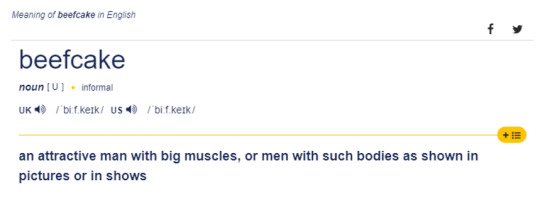
So, in no particular order (because the genres are sometimes different so making comparisons wouldn’t be fair):
1. Street Fighter series.
Hardly a surprise considering that this is a series that has a legacy firmly placed in the gaming world. Although you don’t really need to know who’s who in order to watch these shows, it doesn’t hurt to know a little about the characters before you jump in - mainly because the creators assume that those who watch it are fans of the show. Expect a fair amount of fighting (the name gives that one away), lots of bromance (Ryu and Ken 4eva!) and the eternal fight of good vs. evil (which is usually the plot of every show/movie)! Even if you aren’t familiar with Ryu & co., the show won’t lead you astray so you can watch without worry. Oh and let me just say - Chun Li is ma gurl! If you want to see a woman that’s not only beautiful but can also kick your ass, then watch these shows - especially Street Fight II the movie!
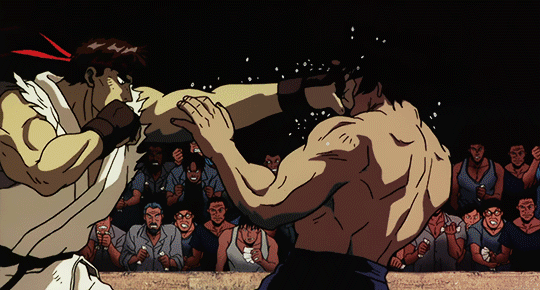
2. Hajime no Ippo.
One of my most favourite sports animes of all time which tells the tale of Makunouchi Ippo and his rise up the ranks of the boxing world. He starts off as a kid that just wants to get stronger so that he can fend off the bullies who harass him. Sick of his weak self (and after a couple of incidents here and there), Ippo joins a boxing gym, starting from scratch and going through basic training. His coach sees his potential and helps shape Ippo into a power boxer who fights head on and never backs down from the fight. Throughout the series, we get to know the other boxers in the gym as well as the competitors that they face, and we watch them battle it out in the ring. It’s a story with a great balance of sports, a sprinkling of slice of life (well, the life of a boxer) and comedy. And, of course, boxing boys come with boxing bodies... and I’m not complaining! And if you enjoy this and want more, try either “Ashita no Joe” (old school classic) or it’s more recent spin-off, “Megalo Box”. Oh and in terms of strong women - no one beats Ippo’s mom! She’s a powerhouse!

3. Baki the Grappler.
More of an MMA vibe with this one - it’s about a kid (he’s like 13 when we first meet him) who has been raised to be a fighter since he was born - his mother gets him the best trainers and equipment money can buy. He eventually feels like he’s outgrown the traditional training method and starts to find other ways to become a better fighter, which includes following his fathers footsteps - training the same way he did and with the people he did - and taking on some of the other fighters he meets along the way. After an altercation with his father (using that term rather lightly), Baki’s path eventually leads to the underground fight scene where challengers can test their strength and face off against each other in an anything-goes type of fight, using whatever techniques, power and skills they have at their disposal. And Baki’s ultimate goal? To defeat his father! It’s got some family drama as the foundation, but when it comes to beefcakes, there’s no shortage here - even if it is a 17-year old kid looking like a grown-ass man. Oh, best to be aware that (excluding the OVAs) there 3 seasons of Baki - the anime series from 2001 and the 2018 Netflix version which covers the "Most Evil Death Row Convicts" arc.
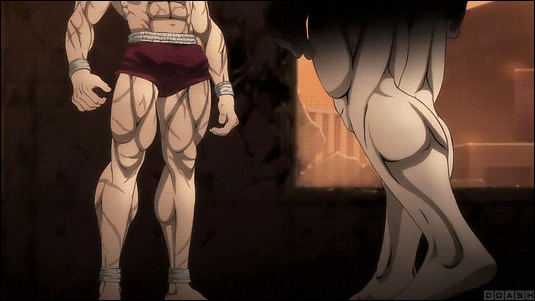
4. Kengan Ashura.
When I first started watching this, the first thing I thought was - ahhh! this reminds me of Baki! And, indeed, there are quite a few elements that are similar. There isn’t any family drama here but there is an underground fight scene where anything goes in terms of fight style. However, the premise here is that the fighters don’t fight for themselves (well, not officially anyway) but that they fight for various companies who settle their business disputes via these types of organised “kengan” matches. It eventually reaches a situation where some of the other businessmen wish to get rid of the current Kengan chairman, and so this chairman organises a huge battle royale for any companies that wish to enter. The prize? The owner of the winning company gets to be the next chairman! This sets the stage for a number of one-on-one showdowns between the various fighter representatives. In terms of background stories, we have two main protagonists and their stories. The one is about a salaryman (turned “CEO”) and his life, as well his relationship with his son, and the other is about a fighter and the vendetta he holds against another fighter for a past incident. Personally, I love the way the fights are presented in this show - not only because of the eye-candy - but because it really does feel like you’re at a grand show! Oh, and unlike Baki, at least most of the fighers are adults.
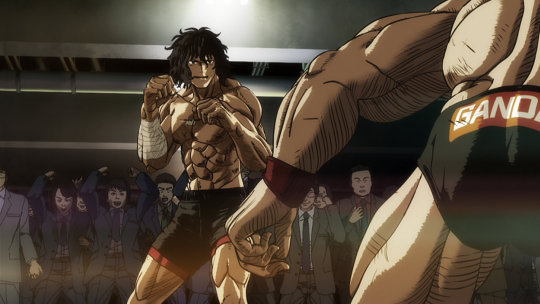
5. Golden Kamuy.
Bring on the boys! Honestly one of the most entertaining shows I’ve watched in a while (and one where I demand that there be another season at least!) and also culturally/historically interesting too. It’s set around the time of the Russo-Japanese war and follows the story of Immortal Sugimoto - a soldier who left active service and finds out that there may be Ainu gold hidden somewhere in Hokkaido. The only problem is that the map has been tattooed in pieces, onto the torsos of various prisoners, most of whom have dispersed to different areas. Nevertheless, thus begins the hunt for the map! Along the way, Sugimoto meets various people along the way - making allies with some and enemies with others - all of whom are associated with each other in interconnecting ways. And all of whom are working toward one goal - get the gold! It’s a brilliant show that’s got some fighting, some mystery, some espionage vibes, some comedy (some of which is could be considered dark and/or weird) and some feels. It balances it all out and makes for an interesting and entertaining watch. Oh, and let’s not forget - a very enjoyable watch too! Mm mm mmm...

6. All Out!!
Another sport anime here, but this time it’s rugby! As someone from a country where rugby is a staple, national sport, this was totally up my ally! The premise is similar to most other school-based sports animes - a kid who’s self-conscious about his height joins the rugby team and learns to get along with the other boys as he trains and works together with them as part of the team. This is not only so that he can help the team improve, but to also prove his own worth. The team goes through training camps and they play against other schools, getting to know some of the opposing teams’ members and establishing some rivalries along the way. It’s pretty typical fare, but damn are these boys stacked! It’s pretty accurate though since rugby is a contact sport which requires some power (and apparently some short, tight shorts) to get the job done. It’s a light watch, but that eye candy is truly sweet!
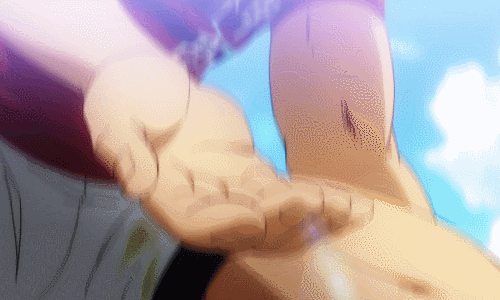
7. Tiger Mask W.
From rugby to wrestling! This actually a continuation of sorts to the original Tiger Mask and Tiger Mask II series, building on the legacy and keeping related in the same sphere, but not directly incorporating the older characters. Unfortunately, the original series is hella hard to get hold of but even without it, you can watch Tiger Mask W without much of an issue. So the story is about a guy who had decided to join a wrestling gym and was pretty happy there until the gym was destroyed by another rival gym. Vowing to take that other gym down, he strikes out on his own and eventually joins one of the national wrestling associations, working in their match roster. But it’s all so that he can reach his goal of taking down that other gym by defeating the players supported by them. Enter into the ring various wrestling friends and both friendly and unfriendly rivals (including an old friend - bromance anyone?) and you get plenty of matches, plenty of muscles and some satisfying action! They also don’t forget the female wrestlers, which is a nice touch! Another one that’s light enough to enjoy at face value - much like how you’d enjoy real wrestling too.
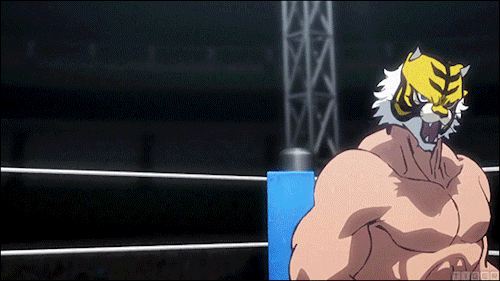
8. Gifuu Doudou!! Kanetsugu to Keiji.
A historical vibe with this one - it’s actually based on the spin-off of the original manga, “Keiji” which was created by Tetsuo Hara. And if that name doesn’t ring a bell, check number 10 on this list and you’ll know who I’m talking about - that’s right, it’s the guy who worked on Hokuto no Ken - and that should immediately give you an idea as to why this show is on the list. It’s a period piece about the friendship between Maeda Keiji and Naoe Kanetsugu - both of whom found their accomplishments on the battlefield. It’s told in hindsight, where they sit together, have a drink or three and reminisce about their younger days and what it took to get to where they are now. I wasn’t quite sure what to expect, but it was pretty entertaining - especially when you see just how clever these guys were when it came to political maneuvering as well as in a fight. Of course, they’re pretty high in the beefcake stakes so if you like your men manly, then you’ve come to the right era.
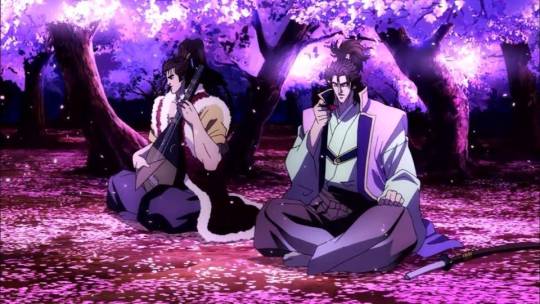
9. Dragon Ball series.
I’m pretty sure that I don’t have to talk about this anime, but in the interest of completeness, let me give you the wiki breakdown about what this anime is about: “The series follows the adventures of the protagonist, Son Goku, from his childhood through adulthood as he trains in martial arts. He spents his life far from civilization, until he is found by Bloomer, a teen girl who encourages him to explore the world in search of the seven orbs known as the Dragon Balls, which summon a wish-granting dragon when gathered. Along his journey, Goku makes several friends and battles a wide variety of villains, many of whom also seek the Dragon Balls.” (source). Of course, this is continued throughout the various series that follow, where Goku has his own family etc. But when it comes to the muscle factor in this show, it’s got it where it counts - everywhere! It’s a classic for a reason so even if you aren’t into beefcake guys, you should still probably watch it if you haven’t already.
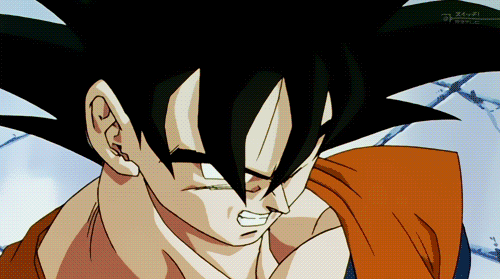
10. Hokuto no Ken.
It just wouldn’t feel right if I had to leave this off the list because when someone says “manly anime”, I’m betting that 99.9% of the time most people think about Hokuto no Ken / Fist of the North Star. It’s the post-apocalyptic era and times are tough, with everyone fighting to survive with what little there is on the planet. Some guys want to be rulers, some guys want to be thugs, but one guy just wants to find his fiancee and do what he can to right the wrongs of the world and make a difference to the people he meets. That one man is, of course, Kenshiro. It’s full-tilt action, usually incorporating martial arts through the various fighting styles of the characters - whether it’s Hokuto Shinken, Nanto Seiken or sometimes just brute force and good old hand-to-hand combat. There’s a few female characters here and there who also kick ass so it isn’t completely one-sided, but they usually end up getting saved by the dudes so take that with a pinch of salt. Post-apocalyptic world or not, these guys sure can maintain their physiques. And when it comes time for a fight, you best believe they pull no punches! If you like pure fighting animes where you get to see people explode each episode, followed by the most epic line ever said in anime, then this is the one!
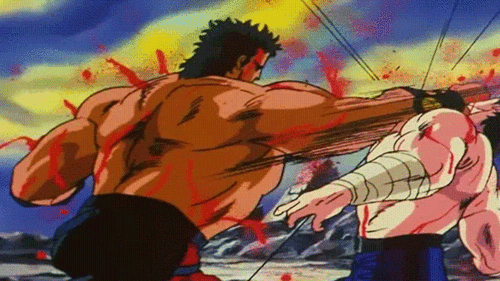
Honourable mentions.
...because, can we really do without more muscular men and women in our lives?
1. Terra Formars - if you’re looking specifically for that muscular vibe, then try season 1. While I enjoyed both, season 1 had better animation (for me) and they all looked badass when defeating those nasty roaches - both the men and the ladies! 2. Hinomaru Sumo - a sports anime that revolves around a newly formed high school sumo club and the career path of the main protagonist. Informative if you don’t know much about sumo and, as expected, loads of meaty guys aiming for victory and aiming for the position of yokozuna. 3. Jojo’s Bizarre Adventure - another show that hardly requires an introduction and would probably take way too long to explain considering how many Jojo’s there are, but rest assured, the guys are packed, stacked and ready to attack! 4. One Punch Man - if only because there a few characters who fit the beefcake category perfectly, e.g. Suiryu (hello there!), Garou and Tanktop Master to name a few. An anime that’s some parts serious, some part hilarious but always flipping shounen tropes on its head. 5. Sengoku Basara - also, not completely beefed out, but there are a few characters who would make the grade, e.g. Maeda Keiji (dejavu from number 8?) and Oda Nobunaga. Another period anime, based on a Capcom game, that uses a lot of poetic licence to make it an exciting watch with very memorable characters. 6. Free! - “Make us free na Splash! Kasaneta... 👏 👏 !” Swimmers bodies - that is all. If you’ve ever seen a swimmer’s bodies in real life, you’ll know what I mean ‘cos they have muscles in all the right places. A slice-of-life sports anime that revolves around high school boys (who eventually become college boys) who engage in competitive swimming. 7. Air Master - The ladies take over in this one, which is a show that revolves around street fighting and the goal of those various street fighters and martial artists to become number 1 on the Fukamichi Rankings. It’s more of that underground fight scene vibe but the main protagonist is a gymnast-turned-street fighter who takes on anyone who’ll challenge her (man or woman) and usually kick their ass. It’s got a quirky/weird sense of humour to it, but that’s part of why I liked it.
Well, I’m pretty sure that there are other shows that I’ve missed, and mountains of characters who have that A-grade beef, but I tried to choose shows that specifically have that muscular aesthetic as a default setting in the show. Hopefully I hit the mark here, sharing my faves with you, but if there’s some show or character that I absolutely must see, feel free to let me know! Because just like Tanigaki’s shirt, I’m always open to suggestions.
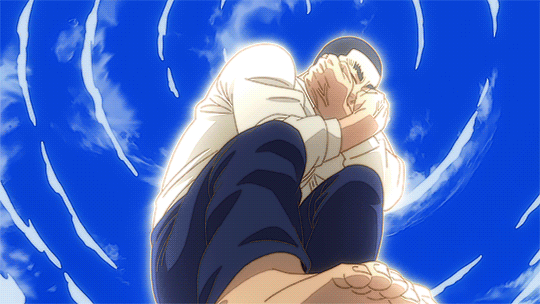
#10 favourite animes#beefcake genre#it's not a thing#but i think it should be#muscular anime characters#street fighter#hajime no ippo#baki the grappler#kengan ashura#golden kamuy#all out!!#tiger mask w#gifuu doudou#dragon ball#hokuto no ken#fist of the north star#terra formars#hinomaru sumo#jojo's bizarre adventure#one punch man#sengoku basara#free!#air master
2K notes
·
View notes
Text
Pinning Down My Kind of Movie
Warning: Wanky, self-indulgent ramblings about Hollywood auteurs to follow
A couple of days ago, I sat down with my housemate to watch Miami Vice (2006) directed by Michael Mann (Heat, Collateral) and starring Colin Farrell and Jamie Foxx. Since we moved into our place, my housemate has gradually been exposed to my taste in movies, and the other day, sat in front of a strung-out Colin Farrell ordering mojitos to ‘Numb/Encore’ during an undercover sting, he finally confronted me with a crisis-inducing statement: “You know, I can’t figure out what your kind of movie is.”
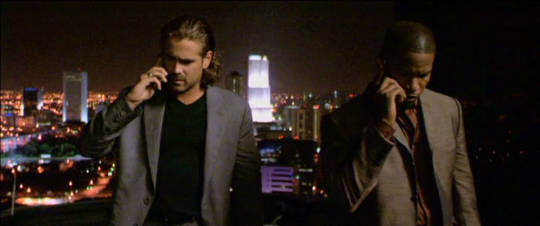
If I am to be totally honest, it doesn’t take much to send me into an existential tailspin, but this observation got me thinking enough to want to sit down and write about it, so here we are. My name’s Daniel and I love movies! When I was a teenager, I was certain I wanted to be a film critic, so I started writing in earnest. The problem was I wasn’t that well rounded as a viewer. I confined myself to the world of comic book movies and Disney animation. I turned my nose up at pretty much everything else before realising that I didn’t actually know much or have much to offer about film. Instead, I turned to music criticism because that’s where my knowledge base is.
That being said, I still loved movies, and as the years have gone on, I have been rapidly expanding my film knowledge and broadened my horizons extensively. I got called a “film buff” for the first time recently, which really shocked me. I still don’t feel well-watched enough, or knowledgeable enough to fit a moniker like that. Maybe it’s imposter syndrome, but I really feel like I have a way to go yet.
My Letterboxd bio includes the phrase “admirer of film nerds”, and I think that admiration informs the entire way I look at the world of film. I read a lot of reviews and listen to a lot of podcasts by smart, unpretentious film obsessives like David Sims, Griffin Newman, Katey Rich, Karen Han and Bilge Ebiri, but that same admiration also informs the kind of films I enjoy the most. In confronting the statement from my housemate, I realised that while there are some genres I gravitate to more than others, my taste in movies is largely defined by the extent to which I can pick up on a single authorial voice driving the film. A director, writer, actor, composer or cinematographer who has a real, obsessive love for their craft whose influence and personality can be felt in every layer of a film’s construction. Franchises are a different beast, but it’s usually the entries in a franchise that feel like passion projects for individual filmmakers that I love the most, which is why Iron Man 3 is by far my favourite Marvel movie.

Over the last few months I’ve started building a fairly extensive Blu-Ray collection. I love physical media because I like to have a tangible representation of the art I love, but it also allows me to physically organise my thoughts about film rather than moving things around on a spreadsheet or in my head. It has also had an effect on how I watch films. Spending money on a film makes me feel more obligated to watch it through to the end in one sitting, to not be on my phone at the same time and to pay closer attention. It’s also made my approach to picking the films I watch more considered. I’ve been hunting down the films I haven’t seen by directors I love, fuelled by newfound completionism, and I’ve been subconsciously prioritising this kind of auteur-driven mindset in a way that has revealed, over time, who my favourite filmmakers are.
So, with that in mind, let’s transform this meandering, self-indulgent think piece into a meandering, self-indulgent listicle. Here are the filmmakers that have changed the way I watch movies:
Christopher Nolan
I know this is a bit of a film bro cliché, but I promise I’m not one of those film school douchebags who’s convinced they’re going to be the next great big budget auteur. Like a lot of other people my age, I discovered Christopher Nolan through the batman movies. I was taken to see The Dark Knight by my parents when I was 10 years old, not having seen Batman Begins, and it blew my mind. For years after that, I was one of those arseholes who had a terrible Joker impression that I whipped out at parties, until I became aware of the cliché and never did it again.
In the years since I’ve watched all of his other movies and gained a new love of Interstellar and The Prestige – movies that taught me a lot about the authorial voice and interweaving a central theme into every element of a film. I also learned that just because I find it annoying when the same tropes turn up in every Quentin Tarantino movie, recurring tropes throughout a filmmaker’s catalogue aren’t universally a bad thing.
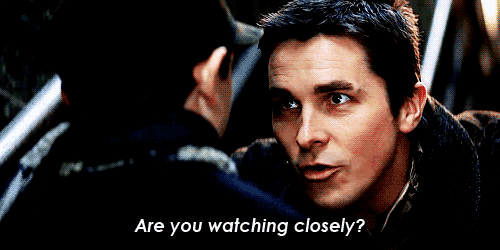
The Coen Brothers
Representation is important. The tough thing about watching films from an auteur-driven perspective is that so many of the most important filmmakers in Hollywood are approaching their films from a white, Christian, male perspective. Scorsese is a particularly difficult director for me to appreciate because so many of his films are overtly informed by his Christianity. My Jewish identity is the most significant aspect of my identity, so naturally I’m always looking for films made from a Jewish perspective, overt or otherwise.
Whilst the Coen brothers don’t always make movies about explicitly Jewish characters or subject matters, their Jewishness always comes out in their writing, particularly in the totally undidactic way they approach the subject of faith in almost every film they’ve made. Their approach to God, fate, spirituality and religion is never one of moralising certainty, but rather a questioning one, which is a fundamental aspect of Jewish existence. I feel represented on multiple levels in the films of the Coen brothers, particularly in Inside Llewyn Davis which is my favourite film of the last decade, in ways that other directors could never manage. For the same reasons I will forever be excited about the potential of the Safdie brothers.
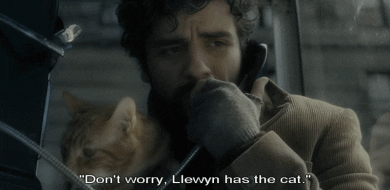
Stephen Spielberg
Whilst the Jewishness of Stephen Spielberg is a major attraction for me (Catch Me If You Can, his moody Christmas movie, comes across as weirdly Jewish to me), the thing that has solidified the guy as one of my favourite filmmakers is his approach to telling true stories. Unlike the Coen brothers, it’s Spielberg’s self-assuredness and didacticism that fuels my love of his work. His spate of recent, politically switched-on, historical dramas (Lincoln, Bridge of Spies and The Post) are all incredible achievements in effectively giving quiet dramas about people talking in rooms the tension and stakes of great action movies.
It’s the obvious thing to say at this point that Spielberg is one of the few genuine masters of the cinematic language, but while most will point to his massive, populist movies of the 80s and 90s as the definitive examples of that, I would point to his spottier late career with its moralising and earnestness as where his most exhilarating work lies.

Michael Mann
I like that Michael Mann is uncompromising. He makes films which, based on premise and star power, should be commercial knockouts, but they almost never are. He has an incredibly clear sense of self, and like Nolan has a lot of frequently recurring tropes in his films. Michael Mann makes films about Men Making Tough Choices™. He builds detailed, intensely researched worlds and he loves crime!
There’s something special when a filmmaker can tread the same ground over and over again and never convey the same central message twice. Nearly all of Mann’s movies are gritty, neo-noir thrillers with an obsessive attention to detail, but all of them deal with a totally distinct existential question which runs through every element of the film, from meta casting to set design, to music, to Mann’s pioneering use of digital photography. I’m just obsessed!

Stephen Soderbergh
Soderbergh is a hill that I’m going to be climbing for quite some time, I think. This is a guy who is relentlessly prolific, taking on a ridiculous number of roles on set himself, and working so fast that he often churns out multiple films in a year. With limited funds and a determination to watch movies legally, my progress through Soderbergh’s filmography has been slow, but I’ve loved every one I’ve watched so far.
As much as I love the guy’s mastery of the heist movie, and the way he slips those story telling devices into a lot of his non-heist stories, I think what really gets me about Soderbergh is the way his filmmaking style always seems to feel tooled towards portraying his characters with as much empathy as possible. Often his films are about people working or learning to empower themselves and coming to terms with their own identities. Anyway, go watch Out of Sight! It’s a damn masterpiece!

Kathryn Bigelow
Kathryn Bigelow’s career is full of insane ups and downs, but as far as I’m concerned, despite the difficulties she’s had getting her movies made and seen, she has three unqualified masterworks: Point Break, Strange Days and The Hurt Locker. On this list of directors, Bigelow has perhaps the most stylistically varied body of work, but her best work, much like that of other directors that I find myself drawn to, is largely concerned with obsession. Her characters are deeply flawed, but unwaveringly driven. What I love is that despite her drastic genre change from pulpy action thriller to hyper-realistic docudrama, she’s managed to hold on to that fascination with obsession, and an acute, outsider’s understanding of masculinity and its fragility.
Kathryn Bigelow has had to adapt to keep working, but because of that, she’s managed to develop a voice and a personality that is versatile enough to withstand her career shifts, but strong enough that it hasn’t been chipped away at by the difficulties she’s faced as a woman in Hollywood.
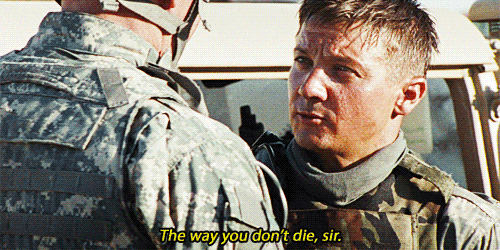
So, what was the point of all this?
Honestly, there wasn’t one. This was a piece of self-indulgence that allowed me to navigate an idea over which I was obsessing for a little while. That being said, I think if I had read something along these lines a few years ago, I would have delved into the world of director-focused movie watching far sooner. It’s hard to quickly and easily define the role of a director in contemporary film, particularly due to the ever growing influence of studios, but in the world in which the above filmmakers operate, the director has final say over all the creative decisions involved in putting together a movie. For me, the most exciting films are the ones that clearly and effectively communicate a single creative voice. Sue me, I love auteurs.
#miami vice#auteurs#christopher nolan#the prestige#the coen brothers#inside llewyn davis#stephen spielberg#the post#michael mann#collateral#steven soderbergh#out of sight#kathryn bigelow#the hurt locker#filmmakers#Jewish film#wanky bullshit
6 notes
·
View notes
Text
Unpacking my Library • Once Upon a Time in the West • Christopher Frayling • 2019






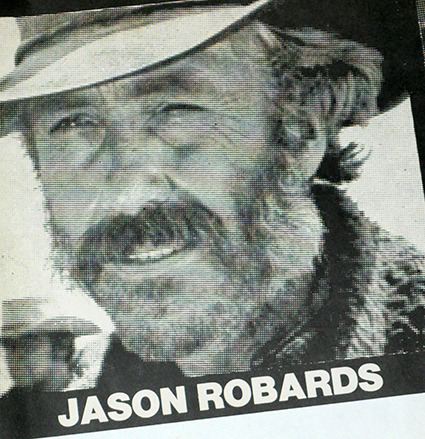
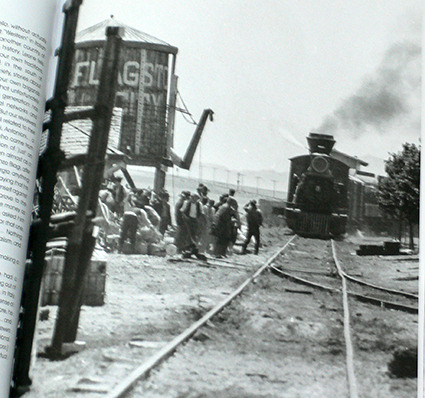
I can resist anything but temptation...especially in relation to interesting and beautifully designed books. Indeed, I’ve always judged a book by its cover, and I was very happy to buy a copy of Christopher Frayling’s new book about Once Upon a Time in the West.
We listened to Christopher, a brilliant performer, speak about the film at the NFT last week. Over the years, Christopher has interviewed almost everybody involved in the making of this film, and the new book collects all of this research, along with stories and pictures, into one place. The author is also an expert in the history of the cinema western genre, and in the Italian film industry too. So, the book has both a depth of detail about the film, and a breadth of context.
Actually, that’s just like the film itself.
The book reminded me that I have a big poster for the film.
I’ve posted before about the film, back in 2011...
There are lots of films about the history of the wild west and many of those films include railway trains. Usually, the train is high-jacked or robbed, or chased by Indians. It’s unusual for the railway system to be structurally embedded in the plot; so as to draw out issues of land-grab, profiteering and social progress. This is post about Once Upon a Time in the West (1968).
The western genre has been a staple of the film industry from the very beginning. Of course, it took a view from outside Hollywood to see what “the Western” could be…
The European Western
During the 1960s, the Italian film industry re-invented the American western film. The genre was attractive for a variety of reasons. The first was that, for many Europeans and because of familiarity, the western was widely acknowledged as a quintessentially American form of film storytelling. Secondly, the pared-down circumstances of the American west allowed for a heightened, or operatic, intensity of drama. Finally, the films were attractive to producers in terms of costs because of their relative economy. These films became identified, because of their Italian origins, as spaghetti westerns.
Italian film-makers drew on their familiarity with the western genre to re-cast the western in a more cynical light than their American contemporaries. Film-makers in America had generally mythologised the west in terms of the harsh, but fair, binary moral certainties of biblical teaching.
The ironic re-invention of the genre became a global phenomenon through the success of Sergio Leone’s Dollars Trilogy. Clint Eastwood was cast as the man-with-no-name bounty hunter, Blondie, and was launched toward global superstardom.
The success of these films encouraged the producers to give the director, Sergio Leone, carte blanche for his next project. That project became Once Upon a Time in the West. In the beginning, the film was elaborated by Leone, Dario Argento and Bernardo Bertolucci. The collaboration between these three produced a story with a conceptual and philosophical sophistication that is unusual for cinema. Argento and Bertolucci both went on to have important careers as film directors.
Marx in the West
The story of Once Upon a Time is set against the land-grab associated with the building of the trans-continental railway. So the drama is played out, against the background of money (capital) and technology (the railway and guns) that provides the determining forces for their actions. The foregrounding of these powerful determinants informs the film with a historical, sociological and psychological realism.
In the 1960s, the critical understanding of human behaviour was advanced through the development of social-science methodologies. The revelation, in detail, of the complex workings of modern society was generally understood as informed by Marxist theory and the pop culture sensibility of the Frankfurt School intellectuals. So, the film provides a watershed by acknowledging and foregrounding, in part at least, the complexity of the systems that determine our behaviour.
Every child is familiar with the railway as a system of interconnected mechanical parts. The model railway layout provides for a perfect representation, in miniature and in simplified terms, of the complex original. It was entirely appropriate that the scriptwriters of Once Upon a Time in the West should focus on the railway as signifier of a specific form of social, political and economic organisation.
The Opening (The Train Arrives)
The title sequence of the film is almost half an hour long. Three men, wearing trademark dusters, await the train and form an intimidating welcoming committee. After a long wait, the train arrives. The men are surprised when no one appears. It is only as the train departs that they become aware of the visitor. After some discussion, a gunfight takes place and the newcomer rides away.
The duster coats are recognised as belonging to a local gang. In fact the agents of railway speculator, Morton, wear the coats as a form of disguise. The ruthlessness of Morton is based on a number of personalities associated with the American railway boom and its associated frauds, scandals and mayhem.
The underhand and double-dealing of the railway speculator provides the framework for a film about violence, duplicity, and revenge.
The duster is a long, loose work coat made of canvas or linen. It was designed to be worn by horsemen and to fit over their normal clothing and to protect it from trail dust. For practical purposes the coat had an exaggerated vent that allowed the coat to be worn comfortably whilst riding. On foot, the coats had a particular flapping gait. In addition the long, loose, coats allowed a variety of guns and weapons to be concealed. Just like the poncho, the coats allowed for the ready and speedy use of firearms. So the flapping duster was associated in the popular imagination, and from its very beginning, with violent and itinerant groups of horsemen.
These specific associations help explain why the duster was rarely seen in the traditional western. The hero, individually isolated, could ride long distances without requiring special clothing except in the most difficult circumstances. Furthermore, the moral integrity of the hero would be fatally compromised by the use of a coat to hide a gun. Lastly, the action of most westerns is played out against the civilised backdrop of town and community. Even the saloon bar setting of many westerns required the protagonists to fight it out in their Sunday best.
At the same time as the first train, and the visitor, is arriving a terrible massacre is occurring. Over at the Sweetwater Ranch, Morton’s gangsters have murdered an entire family, including the children; the McBains. They are gunned down as they prepare to welcome their new stepmother to the home. The arrival of this woman into the family is a sign of better things. After years of struggle and isolation, the railway is coming and the water, at the eponymous Sweetwater, will bring people, wealth and excitement. Sweetwater will become a whole town and community. McBain’s prescience will have been vindicated.
The Ending (The Railway Arrives)
At the end of the film, the railway is shown arriving at Sweetwater. The new Mrs McBain is shown welcoming workers to a feast and with great pitchers of refreshment. So, notwithstanding all the violence and mayhem, the railway is acknowledged to be an instrument of social progress…
The film starred Charles Bronson, Jason Robards and, cast against type, Henry Fonda. The female lead was Claudia Cardinale. The film has a remarkable musical score by Ennio Morricone.
This is my all time favourite film. I’ve watched it many times and I’m still amazed by it. It’s big, and clever, and beautiful. If you watch the film and like it, give Michael Cimino’s Heaven’s Gate (1980) a go.
Supplemental Sunday 21st August 2011
The film is routinely described as “epic.” It’s certainly got big themes played out against the big spaces of the mid-west. Amongst the cruel brutality there are passages of amazing beauty. One of these, my favourite, is the scene when Mrs McBain (Claudia Cardinale) arrives at Flagstone Station. The train pulls up, she gets off, and is a bit surprised that there is no one to meet her (she doesn’t know that the entire McBain family have been murdered). She moves along the platform and arrives at the ticket office. The camera moves vertically over the building to reveal the town beyond.
The whole scene is touched by the terrible pathos of what we know to have happened. The amazing music by Ennio Morricone adds the finishing touch.
I’ve watched the film loads of times and have payed the opening sequence over and over. Even after all these years, and notwithstanding this familiarity, the sequence of Mrs McBain arriving still amazes me. The combination of pathos, sadness, and beauty; all combined in image, movement and music, is heartbreakingly moving.
0 notes
Note
would you be willing to make a list of your favorite lesser know period dramas so people new to the genre can watch them? You post so many pictures of shows I don't know! ty love your blog :)
I absolutely would! (sorry it took me a little while to get around to this!!!! Forgive me!!!)
I’ll start with my three favourites because I feel like they’re lesser known and they are brilliant, in my opinion.
Harlots (2017- present) - A drama series about brothels and sex work in 18th century London. Absolutely fabulous, historically accurate in almost every aspect, include the variety of its characters. You can watch it on Hulu and NowTV as well as streaming it online. Also, the DVD of Season 1 is released tomorrow so!
Magnificent Century (2011-2014) , Magnificent Century: Kosem (2015-present) - Although technically two different series, MC: Kosem is a follow-up to Magnificent Century. These are two Turkish soap operas set during a period in Ottoman history known as “the Sultanate of Women”: basically a period during the 16th and 17th century where a woman from the Ottoman harem, be she a concubine, a mother or a sister, held considerable power, sometimes even more so than the reigning sultan. The first series of MC is available with English subtitles on Netflix: after that, the rest of the episodes can be watched on YouTube alongside this translation site. Same goes for Kosem, although the first episode was released officially with English subtitles on YouTube and can be watched here. The episodes are all very long: some about 2 and a half hours. But it’s such a great franchise, I love it so much.
Peaky Blinders (2013-present) - Set in working class Birmingham just after the First World War, it’s essentially about British gangsters, specficially the Shelby family, though it focuses most on their young patriarch, Tommy Shelby. It’s superb. The cast are amazing (Cillian Murphy, Sam Neil, Tom Hardy...) and it’s just so energetic, political and dynamic. I think I love it for two big reasons: 1) We hardly ever get period dramas about working class Britain and when we do, they’re always miserable and depressing. Peaky Blinders can be miserable and depressing but it also shows these families for what they are: the absolute backbone of this country. And 2) The Shelby family are half-Rromani. I’m half-Rromani myself so to see a representation for me on a primetime BBC TV series has been so good. They speak the language sometimes too! And indulge in some of the traditions. I recently saw Peaky Blinders on a stupid list of “Yet more period dramas about white British people” and it was ANNOYING. It’s been great for Rromani representation. You can watch it on Netflix!
That got super long, so here are a few lesser known period dramas (both films and TV series) that I have watched in my time and would absolutely recommend:
Charles II: The Power and the Passion (2002) - Apart from the fact this is about my favourite historical figure ever and is absolute perfection, it also has a stellar cast (Rufus Sewell, Helen McCrory, Martin Freeman, Rupert Graves, Shirley Henderson, Ian McDiarmid....need I go on?).....so if you want BBC period drama perfection, as well as a foray into the Best Period of British History Ever (the years 1660-1685 I DO NOT MAKE THE RULES), it’s a must-see.
Maison Close (2010) - Similar to Harlots in that it’s about a brothel, but it’s set in France in the 1870s. It’s just as gritty and realistic in its portrayal of sex work, though. It was very popular but cut short, unfortunately. Still an absolute must-see! You can watch it with English subs on Amazon Prime, and I assume it is easily streamed.
Bajirao Mastani (2015) - This is a Bollywood epic so it does have musical numbers but it’s also absolutely phenomenal. It’s set in the Maratha Empire in the early 1700s and is about the famed Peshwa (Prime Minister), Baijrao, and his love for a Muslim Raput princess, Mastani (who’s also a warrior and swords-woman.) Bajirao is also married to another woman called Kashibai who loves him dearly. It’s about love, it’s about prejudice and it’s about women trying to find some common ground for the man they love.
Shakespeare in Love (1998) - This is not necessarily lesser-known but I feel like it’s one of those films you literally have to see, especially if you like period pieces. It’s a comedy, largely fictional and tells the tale of how a young Will Shakespeare came to write Romeo and Juliet. He falls in love with a young noblewoman called Viola de Lesseps, who also happens to be an aspiring actor in a time when women are barred from the stage. Whilst the cast really blows every other cast I’ve mentioned out of the water, the highlight is probably Judi Dench as Elizabeth I. She has about....idk.....15 minutes screen time at most? But she won an Oscar for her performance anyway.
Elizabeth I (2005) - There are so many things about the Virgin Queen but this is my favourite since it covers the latter years of Elizabeth’s reign and focuses on both her political and personal life. I especially love her romance with Robert Dudley (played by Jeremy Irons) because usually, we see them as young people and it’s nice to see them older and experienced. Helen Mirren plays Elizabeth and....well....it’s Helen Mirren.
There are definitely more, especially ones set during my favourite period (17th & 18th century) which I don’t mind making another post for. But these are some of my faves!
69 notes
·
View notes
Text
An introduction to Pretty Film Fanatic & a 33 film questions tag!
Hello. This is my first post on Pretty Film Fanatic. I’m not exactly new to blogging, but this is my first attempt at writing a film blog. I wanted to share the prettiest films I know. This is not only so that others may benefit from some recommendations but so that I have a visual collection of films I’ve watched. Creating this blog has made me absolutely euphoric and also ever so slightly nervous. With that said I thought I would do a quick film related ‘tag’ as my first post so, that you could learn some more about me, and get an inkling of what is to come. I came across this tag on: agreatmovieblog who in turn found it from thebookishunderdog. I have not been tagged, but I thought it would be great fun to do this! However, I am only going to do 33 questions to make the tag slightly shorter.
1. How often do you watch a movie?
I try to watch films as often as possible. But lately, I have only been watching them on the weekends. I like watching films with company and I usually have someone to enjoy them with me on a Friday night or Saturday afternoon.
2. What movie genre are you particularly fond of?
I really like period dramas, I really like weighing up historical accuracies and noticing interesting interpretations of the aesthetics of the time. I am also a fan of the social realism film, even though, I really love getting lost in films that are more fantastical than realist.
3. What was the last movie you watched and liked?
The last film I watched and liked was probably a British crime thriller from 1962 called, Don’t Talk To Strange Men. A cautionary tale about a young woman who starts a relationship with a man in a phonebox and naively knows nothing about stranger danger.
4. What was the last movie you watched and hated?
Probably... 2017′s Rings. The acting was really poor, and there was no plot difference to The Ring, except it incorporates more modern technology. I really liked the Japanese version of The Ring. But, these sequels are usually not very great.
5. What is your fave movie of all time?
The Umbrellas of Cherbourg (1964) A romantic, social realist, operetta. This film will feature on this blog within the next couple of weeks.

6. Your fave guilty pleasure movie?
Every Christmas I rewatch Gillian Armstrong’s 1994 version of Little Women. I find it really gets me in the Christmas spirit. I’ve watched it every Christmas since I was 5. It is one of the first period dramas that I remember watching.

7. What movie have you watched a million times already?
I have probably watched Devil’s Bride quite a few times, as it is on Netflix and I very almost presented a presentation on it for my English class which very much involved the portrayal and treatment of witches during the witch-hunt in europe.

8. Are you the type who watches a movie on its first day of showing?
Not really. I will if it is on at my local cinema and I am really excited about it. I prefer to buy the film later on, when the digital copy is cheaper than the cinema ticket.
9. Do you use fandango or prebook movie tickets?
I’ve never really used fandango. I prebook movie tickets if I am really interested in seeing the film on the big screen.
10. Movie House, Bluray or download?
Sometimes Netflix, usually I rent films in HD via Amazon Prime, and download DVD films using Cinematique. I like watching films on the channel TalkingPictures because they show some interesting films pre-1980. I was never particularly impressed with Bluray, but at the time of its popularity I did not have a Bluray player. I tend to find films to watch via MUBI and the search for the film begins from there.
11. How often do you go to the cinema to watch a movie?
I go to the cinema to watch a movie perhaps once every 3 months.
12. What are the movies that made you cry?
I do not really cry at films. But, films that elicited an emotional response from me were: The Color Purple (1985) directed by Stephen Spielberg.
“Me and you, us never part. Makidada. Me and you, us we have one heart.”
Honorable mentions: Nobody Knows (2004) directed by Hirokazu Kore-eda, Lilya-4ever (2002) directed by Lukas Moodysson and Au Hasard Balthazar by Robert Bresson.

13. Do you watch foreign films?
Yes. I am particularly fond of Korean thrillers, Japanese dramas, and French new wave.
14. What are your favourite foreign films?
Anything from Jacques Demy’s ‘Romantic Triology’, I also really enjoyed Agnes Varda’s Vagabond (1985) about the life of a girl wandering her way through French wine country.

15. Who are your favourite directors?
I would not say I have a particular favourite director. I tend to judge individual films on their own merits rather than on the idea of the auteur. That being said I do enjoy the styles of Ozu and Wong Kar Wai.
16. Are you particular with movie scores / soundtracks / music?
I do think a score of a film really brings the film together and can help separate the world of the film from real life.
17. What movie soundtracks can be found in your ipod?
I do not use an iPod anymore but you can catch me listening to Michel Legrand’s soundtrack for Umbrellas of Cherbourg on Apple Music.
18. Have you ever watched a movie alone in the cinema?
I think I find watching movies with company far more comfortable than alone. It is always nice to share the experience with another, and have someone to talk about the film with afterwards. However, I once went to an industry day at the British Film Institute where at the end, they showed Four Weddings and A Funeral (1994) in order to showcase an example of cinema with a distinctly marketable British identity. I think my friend was running late to meet me. So, I stayed to watch it alone. Richard Curtis films are something I can take or leave though.
19. Is there any movie that’s changed your perspective on life?
I would probably say Last Life In The Universe (2003) by Pen-ek Ratanaruang. The first time I watched it was significant to me, the 2nd time I watched it was a poignant time too. If it taught me anything, it is to be appreciative of people who connect with you in life.

20. Your favourite comic book movie?
Probably, Tekkonkinkreet (2006) in Japanese dub. I enjoyed the film despite differing art style from the manga, it was still nice visually. A good coming of age film about brotherhood.

21. Do you read movie critic reviews before watching a film ?
Not really. I tend to take what critics say with a pinch of salt. Of course there is artistic merit in a film and that can be judged. But, generally... I’d rather decide for myself whether I enjoy a film without any influence from critic.
22. Do you watch the movie before reading the book or vice versa ?
I’ve absolutely zero preference when it comes to this. Sometimes I may read a book that had a feel film adaptation and find extra details that were not included in the film. That is always fun.
23. Favourite Drama movie?
The Day I Became Woman (2000) directed by Merzieh Meshkini. An Iranian film about the experiences of three different women in different stages of their womanhood and societal constraints put upon their identities.

24. Favourite Western movie?
Meek’s Cut Off by Kelly Reichardt a film about a group of settlers been led down the Oregon desert, by a guide who might actually be lost.
25. Favourite horror?
The Tennant by Roman Polanski.
26. Favourite Sci-Fi?
This is not really a film, but an episode of an anthology television series. Rod Serling’s Twilight Zone. But, particularly the episode Number 12, Looks Just Like You (1964
27. Favourite war movie?
I would probably have to say La Grande Illusion (1937) by Jean Renoir. A pacifist film about the futilities of war. The film concerns a small group of prisoners of war, who are of different nationalities as they attempt to escape from their imprisonment. The film celebrates the universal humanity that transcends national and racial boundaries and radical nationalism, and this in itself should prevent political division amongst humans.
28. Your least favourite movie of all time?
I would have to say La Grande Bouffe (1973) It had a bit too much gluttony and bodily functions for my liking. I understand its satirising consumerism and bourgeois decadence... But, it made me feel squeamish.
29. Ever made movie reviews?
I’m going to write some with this blog!
30. Favourite movie quote?
“Give me the bat...” - Jack Torrence from The Shining (1980)
31. Favourite song in a musical?
Moon River - Breakfast at Tiffanys (1961). Or, Have Yourself A Merry Little Christmas - Meet Me In St Louis (1944).

32. TV series, books, computer games or movies in order of interest?
Movies, T.V. series, books, and computer games.
33. Lastly, if your life story was to be made into a movie, who would you like to portray you? Who should be directing it and what would be the title?
Any time someone asks me this question I never know the answer. I think I would like to be in some kind of technicolor playing some kind of beautiful, richly dressed high society girl. I’m not sure who I would want to portray me. I would want the plot to be as far from my life as possible though.
So, that is me. I’m so excited for what is to follow. I will be back soon with a review of a film.
If you would like to do this tag go ahead. I’d love to see your answers if you do!
#film#flimblr#movies#movies tag#cinema#cinema tumblr#musicals#film tag#movie questions#questions#introduction#prettyfilmfanatic#films
0 notes